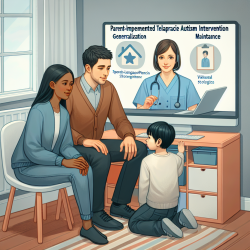Unlock the Secret to Better Child Outcomes with These 4 Proven Strategies!
As a passionate speech-language pathologist, you’re always looking for ways to improve the outcomes for the children you work with. Recent research titled "Four propositions on integrated sustainability: toward a theoretical framework to understand the environment, peace, and sustainability nexus" provides valuable insights that can be applied to your practice. This blog will break down the findings and show you how to implement these strategies to create better outcomes for children in your care.
1. Prioritize Basic Needs
The first proposition from the research emphasizes the importance of preventing deprivation in basic human needs. For children, this translates to ensuring they have a stable environment where their physical, emotional, and educational needs are met. Data shows that children who have their basic needs met are more likely to succeed in therapy and show significant improvements in their speech and language skills.
Action Steps:
- Ensure children have access to nutritious meals and adequate rest.
- Work closely with families to create a supportive home environment.
- Provide resources and referrals for any additional needs the child may have.
2. Promote Individual Agency and Equity
The second proposition focuses on promoting individual agency, equity, and opportunities. This means recognizing and addressing the unique needs of each child and ensuring they have the resources and support to reach their full potential. Research indicates that children who feel empowered and supported are more engaged and motivated in therapy sessions.
Action Steps:
- Customize therapy plans to meet the individual needs of each child.
- Encourage children to set their own goals and celebrate their achievements.
- Advocate for equitable access to therapy services for all children, regardless of their background.
3. Safeguard Social and Environmental Goods
The third proposition highlights the importance of safeguarding public, social, and environmental goods. For speech-language pathologists, this means creating a safe and inclusive environment where children can thrive. Data shows that children who feel safe and included are more likely to participate actively in therapy and make progress.
Action Steps:
- Create a welcoming and inclusive therapy environment.
- Implement practices that promote social inclusion and environmental sustainability.
- Educate children and families about the importance of a healthy and sustainable environment.
4. Foster Cooperation and Regulate Competition
The fourth proposition suggests that sustainable development involves resolving conflicts through institutions that facilitate cooperation and regulate competition. In a therapy setting, this means fostering a collaborative approach and managing any competitive dynamics that may arise. Research shows that children benefit from a cooperative environment where they can learn and grow together.
Action Steps:
- Encourage collaborative activities and group therapy sessions.
- Manage any competitive behaviors to ensure a positive and supportive environment.
- Work with other professionals to provide comprehensive and coordinated care.
By implementing these four strategies, you can create a more supportive and effective therapy environment for the children you work with. Data-driven decisions and a focus on integrated sustainability can lead to better outcomes and help children reach their full potential.
To read the original research paper, please follow this link: Four propositions on integrated sustainability: toward a theoretical framework to understand the environment, peace, and sustainability nexus.










